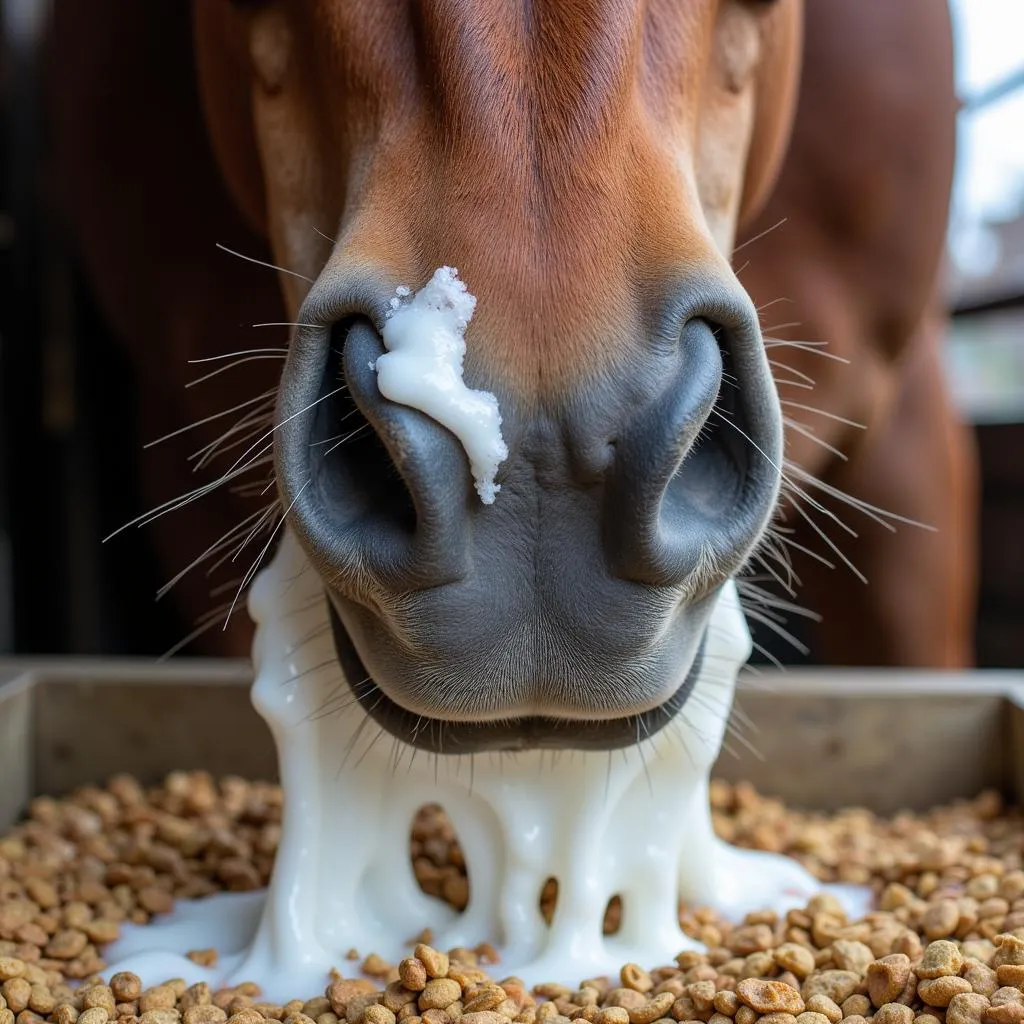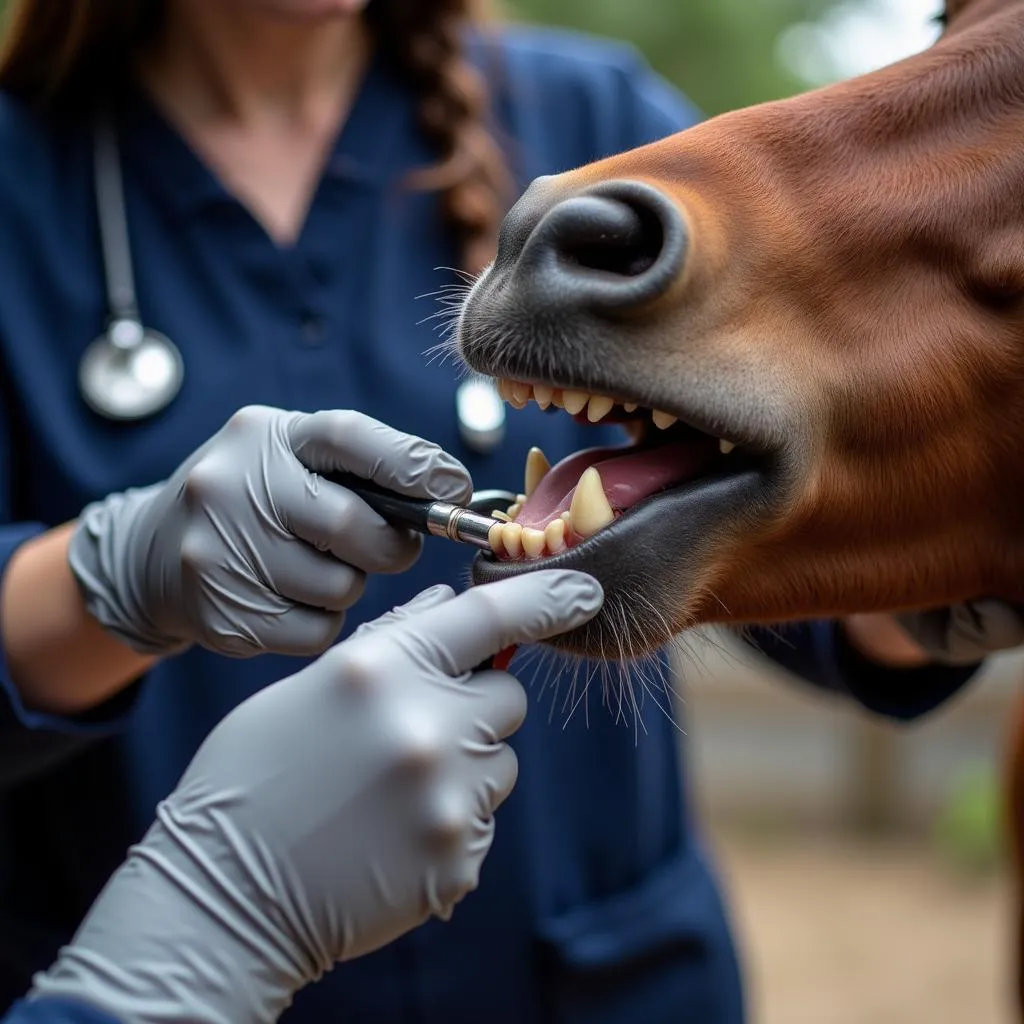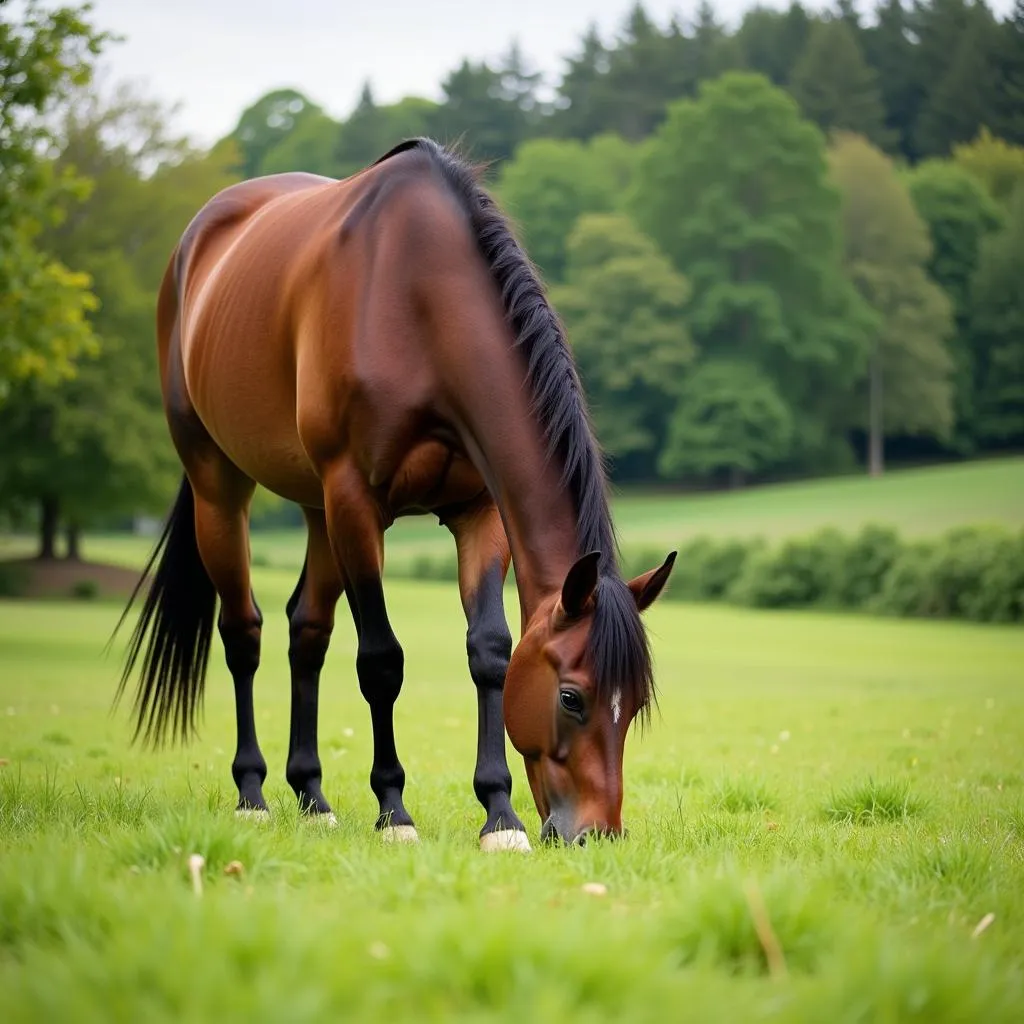When your horse is foaming at the mouth, it’s natural to feel alarmed. While some causes are benign, others can indicate a serious health concern. Coupled with a loss of appetite, it’s crucial to understand the potential reasons behind this concerning combination and take appropriate action.
 Horse Foaming at the Mouth While Eating
Horse Foaming at the Mouth While Eating
Understanding Foaming at the Mouth (Hypersalivation) in Horses
Hypersalivation, the excessive production of saliva, is often a symptom rather than a disease itself. Horses may foam at the mouth for various reasons, some harmless and others requiring immediate veterinary attention.
Common Causes of Foaming:
- Mouth Irritations: Injuries, ulcers, infections, or dental problems can cause discomfort and lead to increased salivation.
- Toxic Plants: Ingestion of certain plants can irritate the mouth and digestive tract, resulting in excessive drooling.
- Choke: Obstruction in the esophagus can prevent swallowing, leading to foaming and distress.
- Poisoning: Exposure to pesticides, herbicides, or other toxins can trigger hypersalivation as a symptom.
- Infections: Diseases like vesicular stomatitis and rabies can cause neurological symptoms, including foaming at the mouth.
Loss of Appetite in Horses: A Red Flag
A horse that’s not eating is a cause for concern. Loss of appetite, medically known as anorexia, can be a symptom of various underlying health issues, some minor, others potentially life-threatening.
Possible Reasons for Not Eating:
- Dental Problems: Painful teeth or gums can make chewing difficult, discouraging horses from eating.
- Colic: Abdominal pain, often due to gas or intestinal impaction, is a common cause of anorexia in horses.
- Stress: Changes in routine, environment, or social dynamics can lead to stress and loss of appetite.
- Fever and Illness: Infections and other illnesses often manifest as a loss of appetite.
 Veterinarian Examining Horse Teeth
Veterinarian Examining Horse Teeth
When Foaming and Not Eating Combine: A Serious Situation
If your horse exhibits both excessive foaming at the mouth and refuses to eat, it’s crucial to seek immediate veterinary attention. This combination strongly suggests a serious underlying health issue requiring prompt diagnosis and treatment.
What You Should Do:
- Call Your Veterinarian Immediately: Describe the symptoms in detail and follow their instructions closely.
- Remove Potential Toxins: Secure your horse in a safe area away from any potential sources of poison.
- Check for Injuries: Examine your horse for any signs of injury or trauma in the mouth, face, or body.
- Withhold Food and Water: Unless directed otherwise by your vet, avoid offering food or water until a diagnosis is made.
- Monitor Vital Signs: If possible, check your horse’s temperature, pulse, and respiration rate.
- Document Observations: Note the duration and severity of symptoms, as well as any potential triggers.
Prevention is Key:
- Regular Veterinary Checkups: Schedule routine dental and health exams to catch problems early.
- Safe Pasture Management: Ensure pastures are free from toxic plants and potential hazards.
- Proper Feed Storage: Store hay and grain securely to prevent spoilage and contamination.
- Gradual Diet Changes: Introduce new feeds slowly to avoid digestive upset.
- Stress Reduction: Minimize changes in routine and provide a stable social environment.
Justus Horses USA: Your Trusted Partner in Equine Care
We understand the deep bond you share with your horse and the worry that comes with seeing them unwell. Justus Horses USA is committed to providing horse owners with the knowledge and resources they need to provide the best possible care for their equine companions.
Remember: This information is for general knowledge and should not replace professional veterinary advice. If you have any concerns about your horse’s health, always consult with your veterinarian immediately.
 Horse Grazing Peacefully in a Pasture
Horse Grazing Peacefully in a Pasture
FAQs
Q: Can horses foam at the mouth for normal reasons?
A: Yes, slight foaming can occur during exercise or when eating certain feeds. However, excessive or persistent foaming is always a cause for concern.
Q: Is foaming at the mouth always a sign of poisoning?
A: While poisoning is a possibility, it’s not the only cause of foaming. Many other factors, like dental problems or infections, can also trigger hypersalivation.
Q: Should I induce vomiting if I suspect my horse has been poisoned?
A: Never induce vomiting in horses without explicit instructions from your veterinarian. It can be dangerous and even fatal in some cases.
Q: How can I prevent my horse from ingesting toxic plants?
A: Regularly inspect your pastures and remove any identified poisonous plants. Consult with a local extension agent or veterinarian for help identifying potentially harmful vegetation.
Q: My horse is foaling at the mouth but seems otherwise normal. Should I still be concerned?
A: Any instance of unusual foaming warrants a call to your veterinarian. While it might be nothing serious, it’s always best to err on the side of caution.
Need More Help?
At Justus Horses USA, we’re here to support you and your equine partner every step of the way. For further assistance, please explore our website or contact us directly:
Phone: 0772127271
Email: [email protected]
Address: QGM2+WX2, Vị Trung, Vị Thuỷ, Hậu Giang, Việt Nam
Our dedicated team is available 24/7 to address your concerns and connect you with experienced equine professionals.